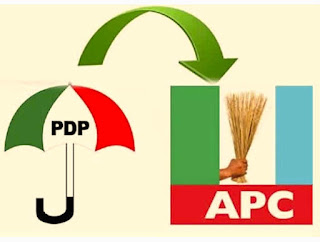THE LOGICAL EXAMINATION AND EXPLANATION OF SECTION 134 (2) (b) OF THE CONSTITUTION OF THE FEDERAL REPUBLIC OF NIGERIA. Written by KEMKA S. IBEJI
Politicians and pundits have crowded our socio-political sphere with pontifications, explications and definitions of this section of the Nigerian constitution. It is obvious that intentions and interests will play serious and diverse roles in the advancement of meanings to the explicandum hence the media has been awash with platoons of explanations.
From this beginning, it will be very important to make it abundantly clear that the profession that have the right of authority to clearly explain the concerns of this section of the Nigerian constitution is logic. It simply means that only logicians are necessarily and sufficiently in the position to lay this issue to rest. It is for this reason that I take the pride of place to explain this particular section of the constitution so as to help Nigeria and Nigerians resolve the issues surrounding the February 25th, 2023 Presidential Election. Beyond enlightening our compatriots on this matter, it will be a resource to the Presidential Election Petition Tribunal (PEPT) in a manner that will assist their quest to stamp justice on the hearts of Nigerians as the tribunal begins to adjudicate on the issues shortly.
Furthermore, any other set of professionals, either lawyers, linguists, or else, that is employed for the purposes of clarification of this section of the constitution that is not a logician will lead the fallacy of argumentum ad verecundiam. This is the mistake in reasoning which occurs when we appeal to wrong authorities.
In essence, logic, beyond being the profession with the exclusive tact to the summum bonum of the constitutional confusion of the moment, it is imbued with the powers of presuppositionslessness in the surgery of all realities. This only means that logic is the only objective tool that can help Nigerians away from the haze of the electoral impasse of the moment. It grasps the truth with every character devoid of prejudice and bias.
Now to the matter proper. Let us restate the words of the ground norm itself this;
Constitution of the FRN Section 134 (2) A candidate for an election to the office of President shall be deemed to have been duly elected where, there being more than two candidates for the election-
(a) he has the highest number of votes cast at the election;
and
(b) he has not less than one-quarter of the votes cast at the election each of at least two-thirds of all the States in the Federation and the Federal Capital Territory, Abuja.
The section of most importance here is subsection (b) which states thus;
(b) he has not less than one-quarter of the votes cast at the election each of at least two-thirds of all the States in the Federation and the Federal Capital Territory, Abuja.
This statement is a logical statement defined by its nature as a declarative statement. It is called a declarative statement because it makes a claim and so can be adjudged as either true or false. Besides, by its form, it is a declarative statement known as a conjunction. Conjunctive statements are compound statements joined by the logical connector or operative "and". So in precise delineation of the logical statement in Section 134 (2)(b) of the Nigerian constitution as considered herein, it will be most logically righteous to outline the union of statements that come together through the application of the conjunct "and" thus:
He has not less than one-quarter of the votes cast at the election each of at;
1. least two-thirds of all the States in the Federation
and
2. the Federal Capital Territory, Abuja.
The statements in (1) and (2) above are referred to in logic as conjuncts. When this logical connector "and" applies or acts on the two statements, it births a compound statement called a conjunction in logic.
Every logic statement adheres to laws and principles. These principles are conditions that have been tested and certified valid in all cases. These principles inform the form of every logical statement and grants it its truth-value. When we mention truth-value in logic, we simply mean that a statement can be said to be either true or false. So truth-value means to be either true or false.
However, conjunctions have a form and conditions under which they can attain and obtain truth-value. These conditions are expressed in a thematic table. Assuming that A and B are the conjuncts as above where A stands for statement 1 and B stands for statement 2, these are the possible truth-values upon the interplay of variables;
A B Truth-value
T T T
T F F
F T F
F F F
Where T = True and F = False
Logically, by explanation, whenever the conjuncts are T and T, the conjunction is T. Whenever the conjuncts are T and F, the conjunction statement is F. Whenever the conjuncts are F and T, the conjunction is also F. And whenever the conjuncts are F and F, the conjunction is F.
In simplified expression, at all instances where the conjunction statement has one conjunct as False, the entire conjunctive statement is False. So the law of conjunction states that "a conjunction is True (T), if and only if the conjuncts are True (T), otherwise it is False (F)".
So in applying this logical rule to Section 134 (2)(b) which is clearly a conjunctive statement (or logical conjunction), satisfying the condition of being means that both conjuncts, in this case, "He has not less than one-quarter of the votes cast at the election each of at;
1. least two-thirds of all the States in the Federation
and
2. the Federal Capital Territory, Abuja"
Can only be True (T) if they satisfy the logical requirement which is that both must be True (T).
For both to be True (T) so as to validate the truth-value of this section of the Constitution as True (T), anyone who must be declared a winner of the Presidential Election must "have not less than one-quarter of the votes cast at the election each of at least (1). Two-thirds of all the States in the Federation "and" (2). The Federal Capital Territory, Abuja".
Logically speaking therefore, for anyone to satisfy the conditions of being declared as the president of Nigeria in a presidential election, such candidate MUST, in fulfilment of Section 134 (2)(b), have not less than one-quarter of the votes cast at the election each of at least (1). Two-thirds of all the States in the Federation "and" (2). The Federal Capital Territory, Abuja".
It is therefore necessary for a candidate to have not less than one-quarter of the votes cast at the election in at least two-thirds of all the States in the Federation. It is also sufficient for a candidate to have not less than one-quarter of the votes cast at the election in the Federal Capital Territory, Abuja. But it is conclusively necessary and sufficient for a candidate to have not less than one-quarter of the votes cast at the election each of at least (1). Two-thirds of all the States in the Federation "and" (2). The Federal Capital Territory, Abuja".




Comments
Post a Comment